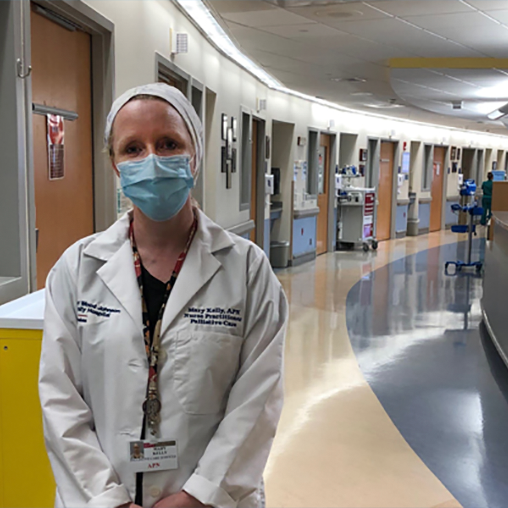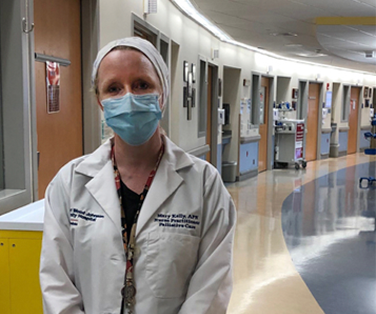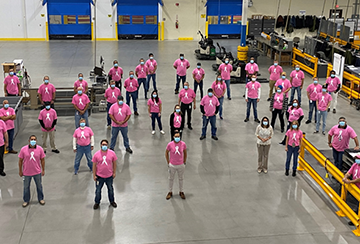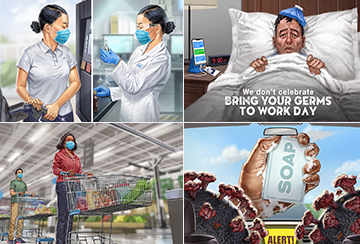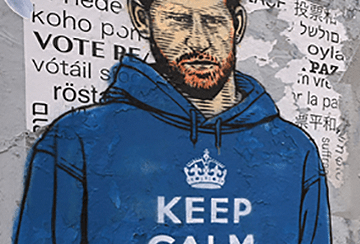Mary Kelly could’ve been working from home. Instead, she chose to don her scrubs and white coat and walk into the heart of the pandemic response in New Jersey, one of the hardest hit parts of the U.S. “It’s heartbreaking at times,” she said of volunteering to provide palliative care to critically ill COVID-19 patients, “but I can’t sit at home and do nothing when I’m being asked to go and help."
Before she took a senior oncology specialist role at Amgen, Kelly was a nurse practitioner and an architect of the palliative care program at Robert Wood Johnson University Hospital. When New Jersey began seeing an overwhelming surge in patients with the novel coronavirus, her former colleagues asked if she could lend a hand.
Kelly was able to say yes, and to spend up to 40 hours a week directly supporting COVID-19 patients given that Amgen is now offering paid leave for medically trained staff in certain regions to volunteer in their communities. Doctors, nurses, pharmacists, first responders and other medically trained Amgen staff in the U.S. and Puerto Rico, for example, can donate their expertise and time on the frontlines of the pandemic while continuing to receive uninterrupted pay, vacation accrual and benefits during a period of full-time volunteer status.
Providing Comfort to Isolated Patients
Working in palliative care means Kelly specializes in helping seriously ill patients, and their families, with advanced-care planning, pain management, and symptom management, helping to provide physical and emotional comfort as many approach the end of their lives.
"There are a lot of patients with COVID-19 on top of other comorbidities that we’re trying to have these difficult conversations with,” Kelly said. “It’s even more challenging because they can't have visitors—there are entire sections of the hospital just for COVID-19 patients where they stay behind closed doors. It can be very lonely, and we try set up family meetings through whatever devices they have access to.”
Kelly has been guiding patients and their families in making tough choices about what kinds of interventions they want if the disease progresses. “Around 50 to 70 percent of the COVID-19 patients who end up on ventilators won’t ever come off the ventilators,” she said. “We try to connect with people and have those conversations before it gets to that point.”
On-Call for Emergencies in His Community
Amgen staff across the U.S. have tapped their medical expertise to support their friends and neighbors. Roy Dean, a district sales manager for Amgen’s cardiovascular medicines, has spent 15 years as a member of his volunteer fire department in the rural mountain town of Sisters, Oregon.
Dean has always used his eight hours of paid volunteer time—a standard benefit for all Amgen staff—to pull extra shifts as a first responder. Now Amgen’s volunteer support for medically-trained staff in the U.S. and Puerto Rico provides additional paid leave that allows him to remain on call throughout his workdays.

Amgen’s medical volunteers program allows volunteer fireman Roy Dean to stay on-call during his workdays, so he can respond to medical emergencies in his rural Oregon community.
"Right now we treat every call like it's COVID-19, so I'm thankful for Amgen's volunteer program because I have flexibility to serve my community any time of the day,” Dean said. “We have new protocols to protect first responders and our families right now, including special ambulances for people with COVID-19 symptoms. This ensures we can continue caring for patients in their times of need."
Dean said that even small, rural towns like his have been affected by the pandemic, and early on, several of the first responders on his team were unknowingly exposed to patients who tested positive before they had adopted the new safety protocols. “We had to operate without three of our headcount for a while because they had to go into self-quarantine,” he said. “Thankfully our community has really taken the stay-at-home requests seriously, and it has been overwhelmingly positive how the community has supported us.
Screening Patients for COVID-19 Testing
When Dwayne Shaw learned that his Houston-area community of Katy, Texas needed medically trained volunteers, he offered his time and expertise as a nurse. He was enlisted to help screen potential COVID-19 patients at a drive-up testing site operated by the Texas Reserve Disaster Registry-Harris County Medical Corps.
“I'm very fortunate to work at Amgen during this time, and I feel obligated to help where I can," said Shaw, who worked as an oncology nurse before joining Amgen as a senior oncology specialist. “I’m a helper, and serving others gives me a sense of purpose.”

Oncology nurse Dwayne Shaw answered the call for medical volunteers to help screen patients at a drive-up COVID-19 testing site in Katy, Texas.
Shaw reported to a pop-up testing site in the parking lot of the Katy High School football stadium, where he had to communicate with patients through their car windows, in the pouring rain. He asked pre-screening questions and provided information to ensure they were prepared for the testing process and potentially long wait times before they could get swabbed in a tent sent apart from other people.
“When the site first opened, before I volunteered, anyone could show up to get tested, which led to people waiting up to four hours, running out of gas and having medical emergencies in line,” he said. “By the time I started, phone screening and assigned times had made it more organized, and the longest wait was about two hours.”
Shaw estimates that around 300 people got tested during his six-hour shift. “A lot of cars had at least two people who needed testing,” he said. “These were all symptomatic people, some of them visibly sick, so part of our job was to check on them periodically and make sure we didn’t need to call an ambulance for anyone.”
Balancing the Risks to Make a Difference
One thing that Kelly, Dean and Shaw all have in common is a commitment to helping patients despite the significant precautions required to keep themselves and their own families safe. “I have three children and a husband at home that I want to keep healthy,” Kelly said. “I definitely make sure I’m being as cautious and careful as possible, but there’s always that concern in the back of my mind.”
Despite the risks, she feels compelled to continue helping as long as she can. “This is a devastating time for everyone, but I’m so thankful that I can help patients and their families,” she said. “I really appreciate all the support I’ve gotten from my manager and regional director, and I feel so fortunate that Amgen has given us all these volunteer hours—it really is a great company to work for.”

